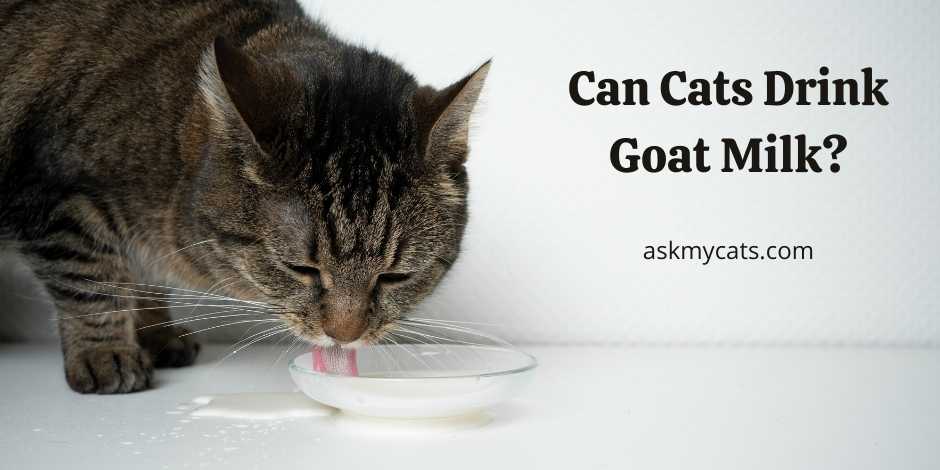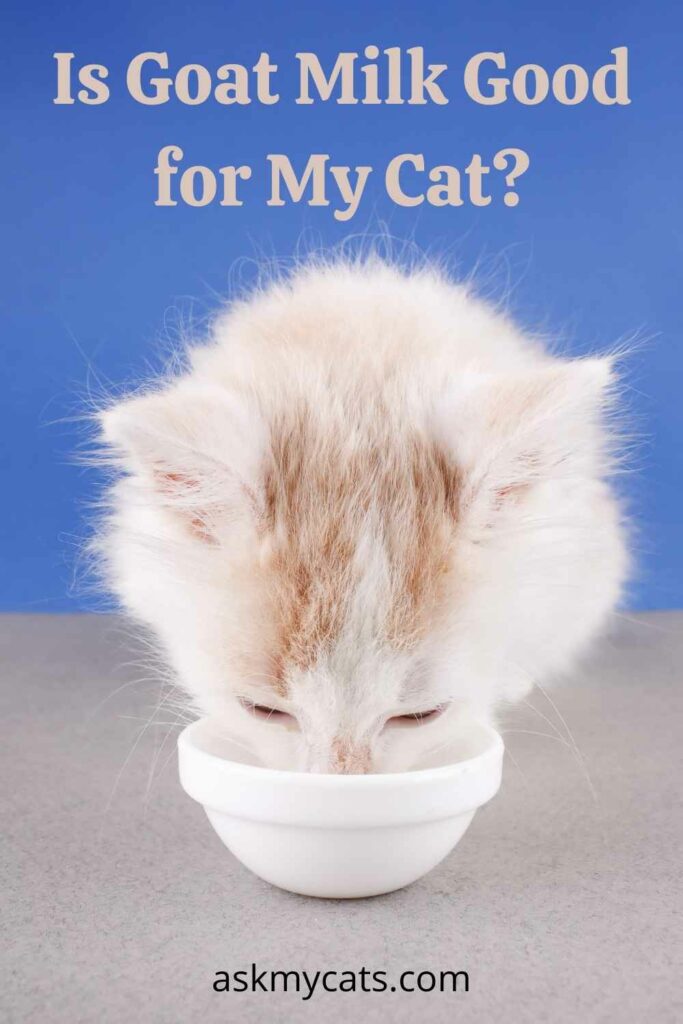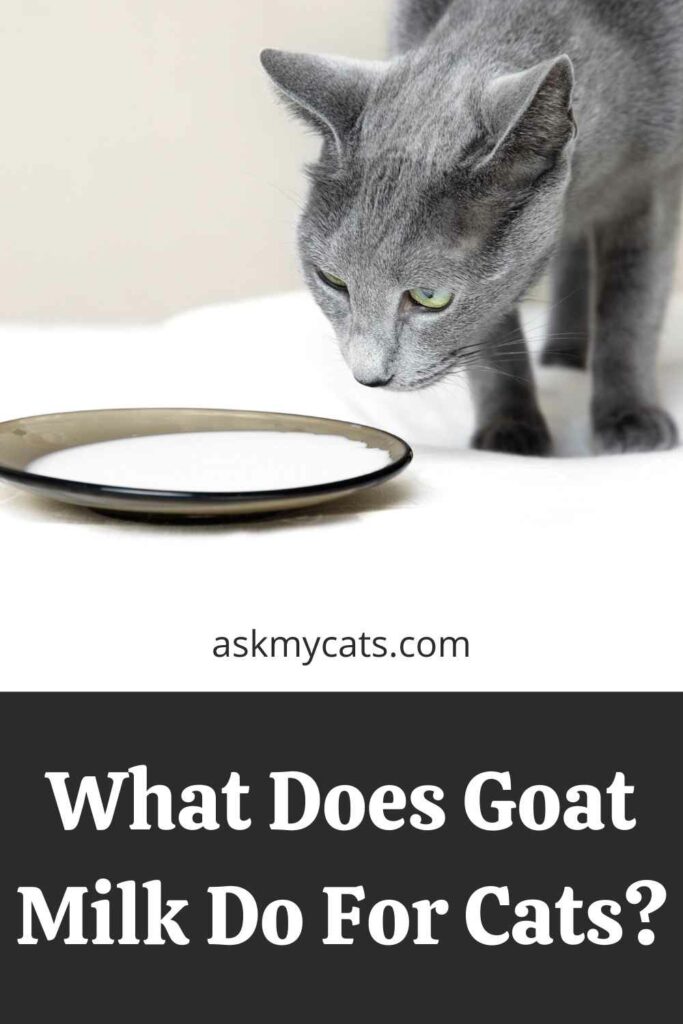Many animals, particularly cats, acquire lactose intolerance as adults, which can cause stomach problems if they are given cow-based dairy products.
Surprisingly, many of these dogs and cats are unaffected by goat’s milk. In reality, goat milk and associated products have some unique health benefits that are worth investigating for your own dog or cat.
Goat’s milk is a nutritious alternative that cats may consume in moderation. When ingested, it has numerous health advantages, and many cats prefer to eat it plain, without any additions or other components.
There might be some health advantages to it as well. Before you start leaving a bowl out, there are a few things you should think about.


Give Your Cat the Perfect Day
Get the Free Ebook!
Is Goat Milk Good for My Cat?
Goat milk is generally good for your cat because it is less allergenic and nutritionally beneficial.

Cow’s milk, like goat’s milk, contains lactose, which is why cat owners are advised not to offer it to their cats. It does have lactose in it. Lactose intolerance can cause your cat to have an upset stomach, as well as diarrhea and vomiting.
Although goat’s milk has less lactose than cow’s milk, it is still present in sufficient quantities to cause illness in your cat.
With that said, some cats can tolerate a small amount of lactose, and because goat’s milk has less lactose than cow’s milk, it’s a good option for those cats that can handle it.
Because goat’s milk is not poisonous, you shouldn’t be alarmed if your cat takes a small amount from your plate or glass, for example.
If your cat can tolerate a little amount of lactose in its diet, goat’s milk’s low lactose content may be useful. Continue reading to learn more about the potential health advantages of goat milk for cats.
The presence of oligosaccharides in goat’s milk is one of its advantages. These help to decrease inflammation in the intestines. Inflammation can be brought on by an injury, or it can be brought on by infections or damaged cells irritating the body.
Goat’s milk can help relieve the pain caused by this inflammation, but you should cease giving it if it causes any severity.
Prebiotics are abundant in goat’s milk. The beneficial bacteria in your cat’s gut govern and battle the harmful bacteria. Improved gut health has been found to offer various health advantages in addition to decreasing diarrhea and vomiting.
It can, for example, lessen the severity of illnesses and possibly enhance your cat’s general immune system health.
For cats and dogs, goat’s milk is a new protein. This implies they are less likely to be sensitive to the components and will not show indications of sensitivity or allergy because it is a protein they are not normally exposed to.
In addition, goat’s milk has fewer fat globules than other kinds of milk, such as cow’s milk. As a result, it is more easily digestible and requires less effort to ingest than cow’s milk. According to estimates, digesting goat’s milk takes around 15 minutes.
If your cat has a history of allergic reactions or sensitivity to cow’s milk, goat’s milk may be a better option because it has fewer side effects.
Also, check out Can Kittens Drink Dog Milk? Can Kittens Nurse From A Dog?
Can Kittens Drink Goat’s Milk?
Goat milk is not advised for kittens since it is extremely low in protein and fat. Kitten milk replacer should be supplied as soon as feasible since goat milk is not nutritionally enough for kittens.
The kittens will cry if the milk becomes contaminated. The only milk that kittens should drink is their mother’s, or a kitten milk replacer, commonly known as KMR or kitten milk formula.
The biggest issue with feeding goat’s milk to your cat is that it includes lactose. Lactose cannot be digested by cats, and most cats are lactose intolerant, thus it can cause stomach discomfort, diarrhea, and vomiting in your cat.
Can Older Cats Drink Goat Milk?
Older cats that are lactose intolerant can drink goat milk without any problem.
Raw goat’s milk is an excellent alternative for a modest and rare reward if your senior cat can handle milk. Goat’s milk is richer in minerals and vitamins than cow’s milk, and it also contains taurine.
Lactose levels in goat’s milk are somewhat lower, although the difference is negligible. Goat milk is more easily digested in rats than cow milk, according to studies.
It also allows for greater iron and copper absorption. Goat milk reduced fat and weight growth in mice while also lowering cholesterol levels.
Also, check out Can Cats Drink Warm or Cold Milk? Which One Do They Prefer?
How Much Goat’s Milk Should Be Fed To Cats?
When it comes to feeding goat’s milk to your cat, we recommend starting gently. Start with only a teaspoon and watch how they respond.
Wait for 12 to 16 hours to observe if they have loose stools or diarrhea; however, if they are lactose intolerant, they may start vomiting much sooner.
Avoid giving your cat goat milk if you detect any loose stools or other unpleasant responses. If no bad responses occur, gradually raise the quantity to a tablespoon or two, but we wouldn’t go any higher than that, even if they seem to like it.
There are still numerous components in their diet that they don’t require, such as fat, which may reach dangerous amounts if consumed in excess.
Can Goat’s Milk Cause Diarrhoea In Cats?
Goat’s Milk can cause diarrhea and dehydration leading to further complications in cats.
Goat milk and milk products have the potential to be beneficial as a complement to a well-balanced diet. This should not, however, be regarded as a single source of nourishment. The fact that goats are ruminants is the main explanation behind this.
Ruminant is derived from the Latin word ruminare, which means “to chew again.” Ruminants are herbivorous animals that consume only plants.
Dogs and cats are known to be omnivores and carnivores, respectively, and their diets are very diverse. Because their food differs from that of other species, the content of their milk will change as well.
Cow and goat milk contain substantially less calcium and phosphorus than dog and cat milk, putting malnutrition and normal skeletal development at risk. Lactose levels in cow and goat milk are greater than in cat and dog milk.
Also, check out can cats drink lactose free milk
Is Pasteurized Goat Milk Good For Cats?
Pasteurized goat’s milk is unquestionably the healthier choice and safer choice for cats.
However, because many cats have trouble digesting dairy after they’ve been weaned as newborns, goat’s milk may cause gastrointestinal problems in certain animals. We recommend only using pasteurized goat’s milk if you want to give your pet goat’s milk.
If your cat accidentally drank any, it will be OK and may have received some essential vitamins and minerals, but it may experience loose stools and diarrhea. If your cat likes it and can handle the lactose, a tiny bit of it can be a nutritious treat.
Because most cats are lactose intolerant, giving them cow’s milk can actually be harmful to their health.
Milk is not an essential element of the cat diet, and many cats suffer from stomach upsets or other issues as a result of their owners thinking they were giving them pleasure.
Also, check out Can Cats Drink Spoiled/Expired Milk? How Gross Is That?
Does Goat Milk Cause Cat Constipation?
No, goat milk is fine for cats and does not cause cat constipation.
Many people have previously used goat milk to relieve constipation, owing to its high amounts of prebiotic oligosaccharides, which aid digestion. While goat milk can be used to relieve constipation, Oli6 offers an adult goat’s milk drink as an alternative.
Goat’s milk, like cow’s milk, contains a sugar called lactose, which can be difficult to digest, causing cramps, gas, bloating, and vomiting in some people.
What Does Goat Milk Do For Cats?
Goat’s milk is high in calcium and phosphorus, both of which are essential minerals for cats.

Calcium aids in muscular contraction, blood clotting, and the formation of strong teeth and bones. Calcium requires phosphorus to function properly, and you should supply it in a ratio of 1.2 parts calcium to 1 part phosphorus.
Vitamin A is critical to a cat’s health and must be included in its food. Vitamin A is involved in the processes that govern the formation and function of the skin, coat, muscles, and nerves.
It is especially critical for pregnant cats and kittens. Night blindness and weakness can result from a vitamin A deficiency. It may also have an adverse effect on muscular and neurological development.
Vitamin B5 aids in the production of glucose and the metabolism of energy in your cat. It is necessary by the body for the production of fatty acids, hemoglobin, and steroids.
Goat milk includes oligosaccharides, which serve as a prebiotic in the body. Prebiotics will aid in the balance and maintenance of a healthy gastrointestinal tract, which will help avoid constipation and diarrhea.
They operate by promoting the growth of beneficial bacteria, which aid digestion and fight off harmful bacteria.
Will Goat Milk Help My Cat Gain Weight?
Yes, goat milk will help your cat to gain weight.
Another issue to consider when giving goat’s milk to your cat is fat. It has less fat than cow’s milk, but cats don’t need fat in their diet, and giving it to them can cause weight gain. You may buy skimmed and partially skimmed goat’s milk, much like cow’s milk, to lower the fat content.
The biggest issue with feeding goat’s milk to your cat is that it includes lactose. Lactose cannot be digested by cats, and most cats are lactose intolerant, thus it can cause stomach discomfort, diarrhea, and vomiting in your cat.
Although goat’s milk contains less lactose than cow’s milk, it still contains enough to harm your pet.
However, there are various degrees of lactose intolerance, and some cats may consume little quantities of lactose without experiencing negative consequences, indicating that they are not lactose intolerant at all.
Is Goat’s Milk Good For Pregnant Cats?
Yes, goat’s milk can be fed to pregnant cats to build up a stable diet.
Pregnant kittens require extra calories and protein, both of which may be found in a high-quality kitten formula. Feeding kitten food to the mother benefits the litter as well: they will want to mimic their mother as much as possible and will begin eating solid food while being weaned.
Make a kitten formula using 1 can evaporated milk, one egg yolk, and one tablespoon of Karo syrup in an emergency. Cow’s milk will give them diarrhea, so don’t feed it to them. Make sure the formula is warm and the nipple aperture isn’t too big or too tiny while bottle feeding.
Interesting Read: Can Pregnant Cats Drink Milk?
How Do You Mix Goats Milk For Kittens?
To increase the nutritional value, we should combine goat’s milk, Karo syrup, yogurt, egg yolks, and gelatin to feed kittens.
In a saucepan, combine 1 quart (0.95 L) of goat’s milk. Then, for each kitten’s age, add the appropriate amount of Knox unflavoured gelatin. Cook over low heat until the gelatin melts.
In a saucepan, combine the goat’s milk and the appropriate amount of gelatin based on the age of the kitten. Remove the liquid from the heat once the gelatin has been dissolved.
Refrigerate after mixing together the remaining ingredients. It will keep in the refrigerator for up to a week.
Also, check out can cats drink evaporated milk
Frequently Asked Questions
How do you dilute milk for kittens?
You must dilute cow’s milk with water, and if they do not have diarrhea after a day, you may continue to give them diluted cow’s milk. Once the kittens are 3-4 weeks old, you can give them formula in a small dish along with some softened cat chow.
What kind of milk is good for cats?
If your cat isn’t vomiting or has diarrhea, he or she can drink tiny amounts of whole, skim, or lactose-free milk. According to some experts, the cream is preferable to normal milk since it contains less lactose than whole or skim milk.
What is the difference between raw goat milk and pasteurized goat milk?
Pasteurized milk is dairy milk that has been heated and cooled using a simple heating procedure to make it safe to consume before being packed and delivered to supermarkets. The difference between raw milk and pasteurized milk is that raw milk does not go through the pasteurization process because it comes straight from the animal.
Final Words
Raw goat milk has anti-mucous and anti-inflammatory effects. This makes it an ideal supplement for dogs and cats that suffer from allergies of any kind, including food and environmental allergies.
Please leave your questions about your pet friend’s feeding habits in the comments area below. We will respond as quickly as possible.

My 16.5 year old cat has been drinking goats milk for about two years. Two tablespoons twice a day. She was doing well on it, but is suddenly having diarrhea. Could it be that she being older now can’t tolerate it? I’m going to drop the amount and see.
Thanks..
Hello Linda,
It’s hard to comment me down the reason for intolerance.
I think you made the correct decision to reduce the amount but still I would prefer to consult with your vet once.
Happy Cat Parenting